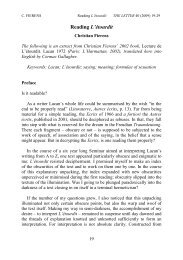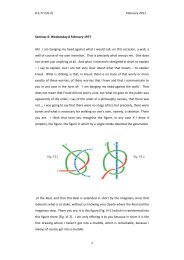the word that scores a bulls eye with you, one can say that opens to the maximumthis dimension of primal repression – how then can this signifier ma<strong>in</strong>ta<strong>in</strong> thiscontradiction of ma<strong>in</strong>ta<strong>in</strong><strong>in</strong>g this gap and at the same time be what ceases not tobe written, for example a very banal note <strong>in</strong> the diachronic scale a completelystupid lah?You see that this wager nevertheless, is what is realised <strong>in</strong> our third moment ofthe S(Ø), of which one could say that the production, of this S(Ø), is the result ofan ultimate dialectic between the subject and the Other through which the oneand the other, by becom<strong>in</strong>g two as I might say, resurrect literally <strong>in</strong> a movementof encounter – through which, I repeat, <strong>Lacan</strong> has not hesitated to employ theword of communion, <strong>in</strong> the production of the witticism – this very bar, this verybar whose paradox is to associate and to disassociate at the same time. Fromthis, if you wish, from this encounter of the subject and the Other, somespecifications, three specifications: first of all it is a matter of a communion, it isnot a matter of collaboration. We know what the subject is capable of when hebecomes a collaborator. Another po<strong>in</strong>t: this mode of communion which isproduced <strong>in</strong> S(Ø) is a mode <strong>in</strong> which, at that moment, the subject does not receivehis message <strong>in</strong> an <strong>in</strong>verted form s<strong>in</strong>ce it would be the only unlikely moment,outside time, really outside time, <strong>in</strong> which the Other would communicate <strong>in</strong> thesame knowledge at the same time. When I say knowledge, it is precisely theknowledge of this bar of this non-be<strong>in</strong>g. You see that the experience of this lackof be<strong>in</strong>g at S(Ø) – and precisely you have to dist<strong>in</strong>guish between aphanisis whichfor its part is one could say an excommunication of the subject – here it is not amatter of be<strong>in</strong>g, here one could say that effectively it is a matter of a communion<strong>in</strong> non-be<strong>in</strong>g and that it is <strong>in</strong> this putt<strong>in</strong>g <strong>in</strong> common of the signifier of S 2 and ofthe signifier lack<strong>in</strong>g to the Other that there is delivered this signifier that Iarticulated and that I am now go<strong>in</strong>g to articulate more closely to the Passe.One might say if you wish, that the bar of the subject and of the Other, bycommunicat<strong>in</strong>g together, carried the subject <strong>in</strong>to the <strong>in</strong>candescence of thisshared lack to the very sources of existence, well beyond the object way beyondthe phantasy. The very fact that along this path the subject renounces thephantasy, short-circuits it, demonstrates, at that moment, that what is76
accentuated by him is the search for this experience of lack <strong>in</strong> a pure state. <strong>F<strong>in</strong>al</strong>lyyou see that what is proper to this response, the ‘It’s you’, as I def<strong>in</strong>e it at thatmoment, that the proper of this response is that it is a metaphor <strong>in</strong> a pure state.If you wish, if the subject had responded: ‘It’s you’ to the Other who would haveasked him: ‘So then yes or no is it me?’ and that then he would have answered,his word, his enunciation would have been the same but would not have had thiseffect of a message of S(Ø) by situat<strong>in</strong>g itself, I would say, clearly metonymically,like this aphasic described by Jakobson who by metaphorical aphasia, could notenunciate the adverb ‘no’ except if one said to him: ‘Say no’ then he can respond:‘No, s<strong>in</strong>ce you say that I can’t say it.....’ demonstrat<strong>in</strong>g, if you wish, by that, thatthe word itself, if it has fallen from its locus of enunciat<strong>in</strong>g, falls itself as a simplemetonymical rema<strong>in</strong>der and loses its value of metaphorical message, as long asyou see that – I am com<strong>in</strong>g back to it, this S(Ø) only has sense when articulated atits locus of emission.Good, s<strong>in</strong>ce it’s late, I am go<strong>in</strong>g to end with the problem of the Passe skipp<strong>in</strong>gover a certa<strong>in</strong> number of th<strong>in</strong>gs.Let us take up aga<strong>in</strong> our story of Bozef. Can we say that Bozef, as th<strong>in</strong>gs havehappened here, has Passed the Passe, namely, we see that Bozef has arrived bydeliver<strong>in</strong>g his message ‘It’s you’, corresponds to what I have located, namely, hasmanaged to do without an <strong>in</strong>termediary, one is no longer 2, one is only 1, toaddress a locus. Bozef, therefore has got to the po<strong>in</strong>t, the topological enunciat<strong>in</strong>gpo<strong>in</strong>t articulated to his enunciated message. But Bozef be<strong>in</strong>g this po<strong>in</strong>t, is he forall that, if he is, as one might say ‘passant’, is he for all that capable of testify<strong>in</strong>g,of realis<strong>in</strong>g that he is <strong>in</strong> the Passe from which he speaks? Is he capable of it? Thek<strong>in</strong>g himself who is supposed to be R4, <strong>in</strong> the position of the analyst, is for his partcapable of recognis<strong>in</strong>g the locus from where Bozef speaks. He hears him. But thek<strong>in</strong>g – it is not by chance that the k<strong>in</strong>g who is the analyst – the k<strong>in</strong>g is not the juryd’agrément. I come back to my question: if the whole value of the message ofS(Ø) is that it should be emitted at a certa<strong>in</strong> locus, how can this locus betransmitted get to the jury? Because, <strong>in</strong> S(Ø), Bozef can susta<strong>in</strong> what he’s say<strong>in</strong>g,but <strong>in</strong> the name of a truth that he f<strong>in</strong>ds himself experienc<strong>in</strong>g but of which heknows noth<strong>in</strong>g: he knows noth<strong>in</strong>g about this locus. In other words: if Bozef is <strong>in</strong>77
- Page 1:
Seminar 1: Wednesday 16 November 19
- Page 5 and 6:
after all noticed that to consist m
- Page 7 and 8:
It would be enough for you to take
- Page 9 and 10:
There had therefore been a turning
- Page 11:
Supposing that we have a torus in a
- Page 15 and 16:
topology encourages us to do so. Th
- Page 17 and 18:
and me, and I who, in short, by din
- Page 19 and 20:
we cut it in two, the front and the
- Page 21 and 22:
is itself a hole and in a certain w
- Page 23 and 24:
Everyone knows that this is how thi
- Page 25 and 26: Seminar 3: Wednesday 21 December 19
- Page 27 and 28: proceed to this double cut, a doubl
- Page 29 and 30: The inside and the outside in this
- Page 31 and 32: egards the structure of the body, o
- Page 33 and 34: inspired by it and its inspiration,
- Page 35 and 36: music on you, is that it has this p
- Page 37 and 38: from the beloved to the lover. What
- Page 39 and 40: that the little o-object is not uni
- Page 41 and 42: Seminar 4: Wednesday 11 January 197
- Page 43 and 44: short I called the discourses; the
- Page 45 and 46: It is flattened out, and in a way t
- Page 47 and 48: astonishes me still more, is not th
- Page 49 and 50: Seminar 5: Wednesday 18 January 197
- Page 51 and 52: see it here, namely, something that
- Page 53 and 54: namely, that everything that concer
- Page 55 and 56: Let’s see. Let us try to see here
- Page 57 and 58: - X: You can’t hear me because pr
- Page 59 and 60: Seminar 6: Wednesday 8 February 197
- Page 61 and 62: its relationship to the body that w
- Page 63 and 64: that in the position B1, would be t
- Page 65 and 66: is in the position of maintaining t
- Page 67 and 68: Effectively the problem of primary
- Page 69 and 70: which I will return later, what is
- Page 71 and 72: the object of desire is not unknown
- Page 73 and 74: that he tells the truth. You see th
- Page 75: look of the Real, there is not, for
- Page 79 and 80: What is happening, is it not, the d
- Page 81: grounded and articulatable way, and
- Page 84 and 85: eason is said to be purloined, whil
- Page 86 and 87: Borromean knot with that of the Ima
- Page 88 and 89: Alain Didier Weill, for his part, i
- Page 90 and 91: Seminar 8: Wednesday 8 March 1977Wh
- Page 92 and 93: shouldn’t tell you, at 7.15 at Ju
- Page 94 and 95: means that the tongue fails, that,
- Page 96 and 97: of his time as a formidable cleric
- Page 98 and 99: It is very difficult not to waver o
- Page 100 and 101: I remind you that the place of semb
- Page 102 and 103: this term in the feminine, since th
- Page 104 and 105: which coincides with my experience,
- Page 106 and 107: and to put that for you in black an
- Page 108 and 109: see, does not see too great an inco
- Page 110 and 111: that exists, he says what he believ
- Page 112 and 113: In short, one must all the same rai
- Page 114 and 115: particular besides, neurotic, a sex
- Page 116 and 117: functioning as something else. And
- Page 118 and 119: mean to deny? What can one deny? Th
- Page 120 and 121: slipping from word to word, and thi
- Page 122 and 123: Seminar 12: 17 May 1977People in th
- Page 124 and 125: y writing. And writing only produce
- Page 126 and 127:
not pinpointed it? He calls this a














